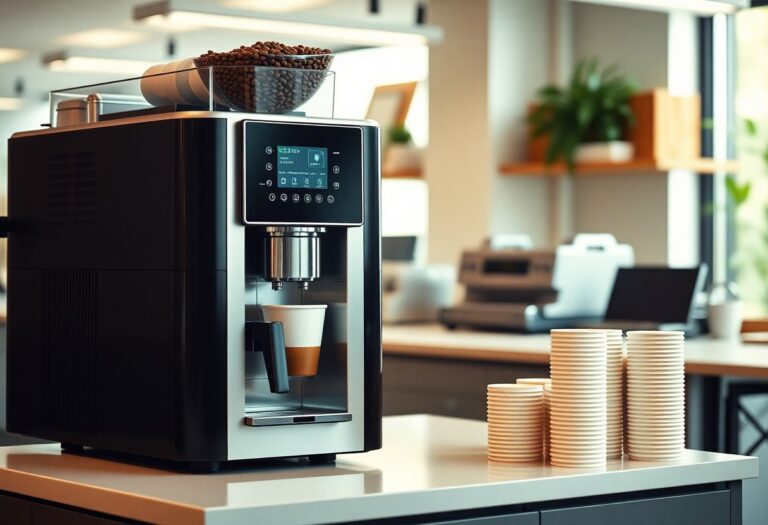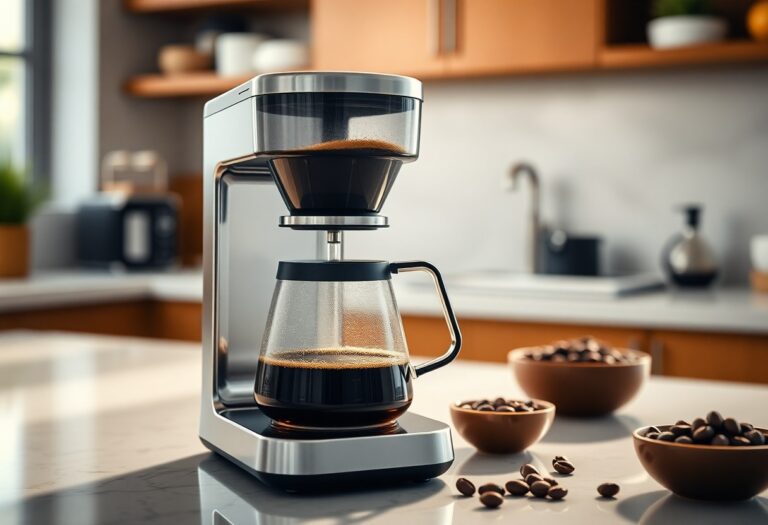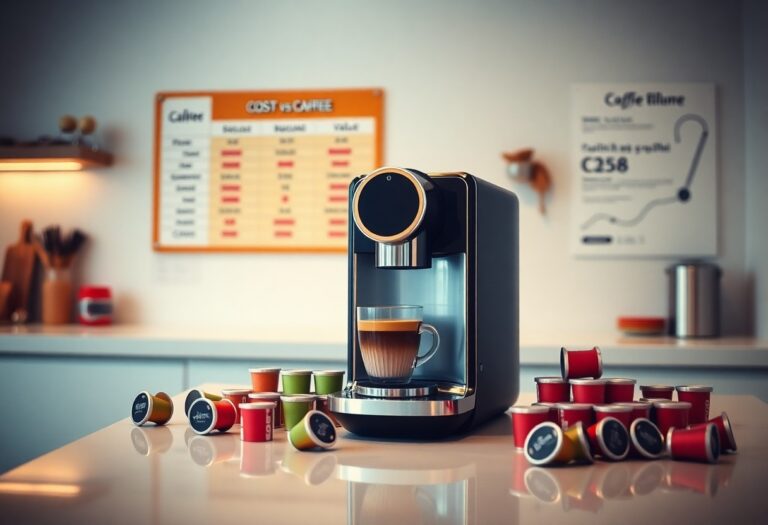What Can You Use to Descale Your Coffee Machine – Descaling Options
Over time, mineral buildup can affect your coffee machine’s performance and the taste of your brew. To maintain the quality of your coffee, it’s important to descale your machine regularly. You can choose from various descaling options, including commercial descalers, vinegar, and citric acid. Each option has its advantages and potential drawbacks, so it’s important to select the method that best suits your machine and personal preferences. In this guide, you’ll learn how to effectively remove limescale and keep your coffee machine in optimal condition.
Key Takeaways:
- Vinegar is a popular and natural descaling agent that effectively removes mineral buildup in coffee machines.
- Citric acid is another effective option, often found in the form of powder or liquid, and is known for its gentle yet powerful descaling ability.
- Commercial descaling solutions specifically designed for coffee machines can provide a convenient and effective method for maintaining your machine.
- Regular descaling is important for prolonging the lifespan of your coffee machine and ensuring optimal flavor in your brews.
- Always consult your coffee machine’s user manual for specific descaling recommendations, as some manufacturers may advise against certain substances.

The Chemistry of Descaling: Why It Matters
Understanding the chemistry behind descaling reveals why it’s imperative for your coffee machine’s longevity and performance. Over time, minerals like calcium and magnesium found in your tap water accumulate and form limescale deposits. These deposits hinder water flow and heating efficiency, which not only affects the taste of your coffee but also puts additional strain on the machine components, potentially leading to costly repairs.
The Impact of Mineral Build-Up
Mineral build-up can significantly reduce your coffee machine’s efficiency. When limescale forms, it obstructs water pathways, which can lead to uneven brewing temperatures and potentially alter the flavor profile of your favorite coffee. In severe cases, scaling can cause overheating or malfunction, necessitating extensive repairs or even replacement.
How Descaling Helps Maintain Your Coffee Machine
Regular descaling is vital for preserving your coffee machine’s functionality. By removing mineral build-up, you allow water to flow freely and heat properly, ensuring optimal extraction of flavors from your coffee grounds. This not only improves the taste of your brews but also enhances the lifespan of your machine, saving you from the expense of unexpected repairs.
Ignoring the need to descale leads to an increased risk of parts failure and can even void warranties. Most manufacturers recommend descaling every three to six months, depending on water hardness and usage frequency. Utilizing a proper descaling solution can help restore performance and avoid the hassle down the line. Investing a little time in maintenance translates to richer, flavorful coffee and a more reliable coffee machine in the long run.
Household Staples for Effective Descaling
Many household items can serve as effective descalers for your coffee machine, offering an economical and accessible solution for keeping it in top shape. These options help dissolve mineral build-up without the need for specialized products. Incorporating them into your regular maintenance routine can significantly extend the lifespan and efficiency of your machine, giving you a tasty cup of coffee every time.
Vinegar: The Classic Solution
Vinegar is a well-known remedy for descaling, thanks to its acidity which efficiently tackles mineral deposits. When mixed with water in a 1:1 ratio, it penetrates the limescale, breaking it down for easier removal. Just remember to run several water cycles after the process to eliminate any lingering vinegar taste.
Baking Soda: A Gentle Powerhouse
Baking soda’s mild alkalinity makes it a gentle yet effective descaler. It works by neutralizing acidic residues and helping to dissolve mineral deposits. Mix one tablespoon of baking soda with a half-full water reservoir, run it through your machine, then rinse thoroughly for a refreshed and clean brew.
When using baking soda, ensure you use a solution that’s not overly concentrated, as too much can leave residue. This household staple is not just a cleaning agent but also a safe choice, as it avoids harsh chemicals while still delivering effective cleaning results. Regular use can prevent limescale buildup while maintaining flavor integrity in your coffee. With the right balance, your coffee machine will benefit from the gentle care that baking soda provides, leading to consistently exceptional coffee experiences.
Commercial Descaling Solutions: What’s Worth It?
Choosing a pre-packaged commercial descaling solution can save you time while ensuring that your coffee machine remains in peak condition. Many products are formulated specifically for different types of machines, providing a tailored approach to tackling mineral buildup. However, the effectiveness of these solutions can vary, and understanding their strengths and weaknesses will help you make an informed choice.
Evaluating the Efficacy of Pre-Packaged Solutions
When evaluating pre-packaged descaling solutions, consider the concentration of the active ingredients—typically citric acid or lactic acid. These ingredients are often more effective than household acids at dissolving limescale. Products labeled as safe for specific brand coffee makers are generally worth the investment, as they reduce the risk of damage to your machine and improve performance.
Comparing Brands: Price vs. Performance
Price can often be a misleading indicator of performance when it comes to commercial descaling solutions. While some higher-priced brands do deliver excellent results, there are also budget-friendly options that perform remarkably well. Assessing reviews and conducting side-by-side comparisons can reveal which products genuinely provide substantial value.
Comparing Brands: Price vs. Performance
| Brand | Performance Rating |
|---|---|
| Brand A | 4.5/5 |
| Brand B | 4.0/5 |
| Brand C | 4.8/5 |
| Brand D | 3.9/5 |
For example, while Brand A may be priced higher, its consistent 4.5/5 performance shows it effectively removes limescale without causing harm. In contrast, Brand D, with a lower rating, might not be as efficient, suggesting a higher price may not always equate to better results. Test both well-reviewed and economical options to determine what meets your coffee machine’s needs without overspending.

Eco-Friendly Alternatives: Sustainable Choices for Descaling
Exploring eco-friendly alternatives for descaling your coffee machine can lead to sustainable choices that are both effective and gentle on the planet. Many natural ingredients can break down mineral buildup without harming your coffee machine or the environment. For more insights on how to descale effectively, check out How to Descale a Coffee Machine?
Citric Acid: Nature’s Powerful Descaler
Citric acid is a powerhouse in the cleaning world, derived from citrus fruits. It effectively dissolves limescale and mineral deposits, making it an excellent choice for descaling your coffee machine. Simply mix equal parts of citric acid and water, run it through your machine, and enjoy a clean brew without the harsh chemicals.
Hydrogen Peroxide and Other Green Options
Hydrogen peroxide, a common household item, also offers a safe and effective way to descale your coffee machine. This versatile compound, when diluted with water, can help break down limescale while being environmentally friendly. Other green options include white vinegar and baking soda, known for their natural cleaning properties.
When using hydrogen peroxide, aim for a 1:1 ratio with water for optimal descaling results. Pour the mixture into your coffee machine’s water reservoir, run a brew cycle, and then flush with clean water to remove any residue. This method not only cleans but also sanitizes without introducing harmful substances. Always ensure you rinse the machine thoroughly afterward to maintain the purity of your coffee flavor.
Best Practices for Descaling: Maximizing Machine Lifespan
Applying best practices in descaling enhances your coffee machine’s durability and ensures optimal performance. Establish a routine that aligns with your coffee consumption and water quality. Not only does regular descaling prevent malfunction, but it also strengthens the machine’s components. Following specific guidelines will keep your coffee tasting fresh and your appliance running smoothly for years.
Frequency of Descaling to Extend Appliance Longevity
Descaling your coffee machine should occur every 1-3 months, depending on your water hardness and frequency of use. Hard water users or daily coffee drinkers may need to descale closer to the one-month mark. In contrast, softer water users who brew less frequently might extend this to three months. The right frequency minimizes mineral buildup and optimizes flavor, extending the lifespan of your appliance.
Step-by-Step Guide to Effective Descaling
Following a structured approach to descaling will maximize results. Begin by gathering your chosen descaling solution, measuring it accurately, and ensuring you have sufficient water to dilute the mix. Run a brewing cycle with this mixture and follow it up with two cycles of clean water to remove any residue. Ensuring all traces of descaling agents are gone prevents any impact on flavor. A thorough rinse and proper maintenance elevate your machine’s efficacy considerably.
Step-by-Step Guide to Effective Descaling
| Step | Description |
| 1 | Gather your descaling solution and water. |
| 2 | Mix according to the manufacturer’s instructions. |
| 3 | Run a brew cycle using the mixture. |
| 4 | Rinse with two cycles of clean water. |
A structured descaling process enhances longevity and performance. Start by preparing your descaling solution, following the instructions for proper concentration. Run the descaling mix through the coffee machine as you would with brewing water, allowing the solution to circulate within. After completing the brew cycle, it’s vital to flush the machine with fresh water multiple times to eliminate any remaining descaling agent. This meticulous approach safeguards your machine’s internal components, preserving both its functionality and your coffee’s flavor for many brews to come.
Conclusion
Summing up, you have various options for descaling your coffee machine, including commercially available descaling solutions, natural alternatives like vinegar and citric acid, or even baking soda. Each method has its benefits, and your choice can depend on your machine’s specific requirements and your personal preferences. Regular descaling not only enhances your coffee’s flavor but also extends the lifespan of your machine. Choose the method that best suits you, and enjoy consistently great coffee.
FAQ
Q: What are the common options for descaling a coffee machine?
A: Common descaling options include commercial descaling solutions specifically designed for coffee machines, white vinegar, citric acid, and lemon juice. Commercial solutions often provide the best results due to their formulation, while household options like vinegar and citric acid can be effective and cost-efficient alternatives.
Q: Can I use white vinegar to descale my coffee machine?
A: Yes, white vinegar is a popular choice for descaling coffee machines. It is an effective natural cleaner that helps dissolve mineral buildup. To use it, mix equal parts of water and vinegar and run it through the machine. After the process, be sure to run a few cycles of plain water to remove any residual vinegar taste.
Q: Is citric acid an effective descaling agent for coffee machines?
A: Citric acid is an excellent descaling agent. It is a natural acid that works well to dissolve calcium deposits. To use citric acid, mix a couple of tablespoons with water and run this solution through the coffee machine. Afterward, it’s important to flush the machine with fresh water to eliminate any remaining citric acid residue.
Q: How often should I descale my coffee machine?
A: The frequency of descaling depends on your coffee machine’s usage and the hardness of your water. As a general guideline, it’s advisable to descale every 1-3 months. If you notice a decrease in performance or if your machine has an indicator for descaling, it’s time to descale accordingly.
Q: What is the best method to descale a single-serve coffee machine?
A: For single-serve coffee machines, the descaling process is typically similar to that of traditional coffee makers. Mix equal parts of descaling solution (or vinegar or citric acid) with water in the water reservoir. Run the machine without a coffee pod several times to ensure thorough cleaning. After descaling, flush the machine with fresh water to clear out any remaining solution.







